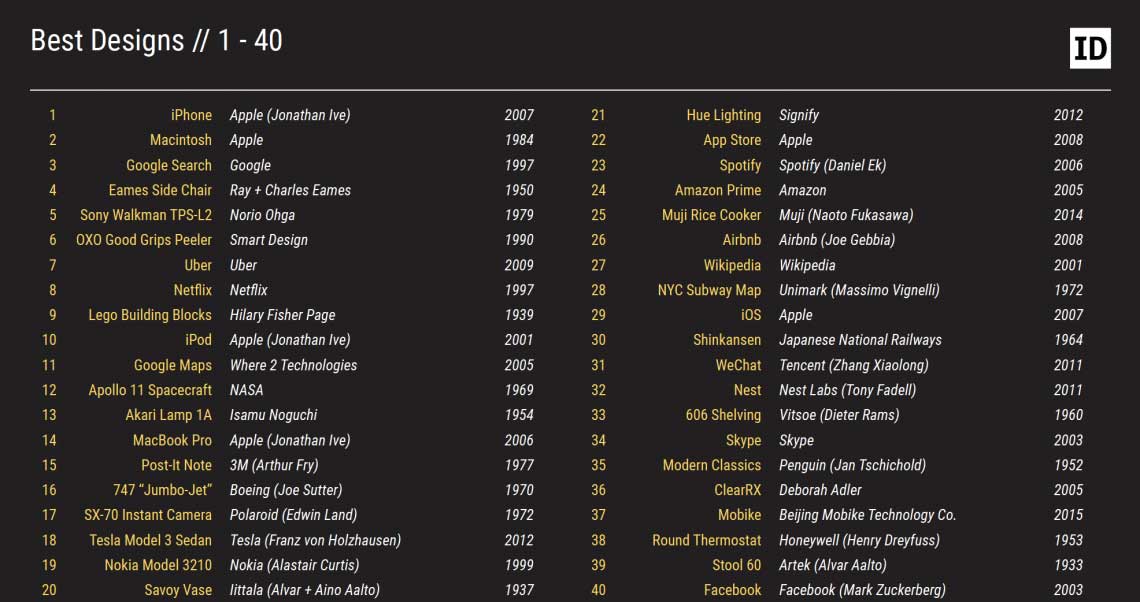Announcing ID’s 2024–25 Latham Fellows
By Kristin Gecan
February 29, 2024

Latham fellows Albert Shum and Thamer Abanami will co-host the next season of ID’s With Intent podcast, slated to release in fall 2024.
The co-hosts, formerly colleagues at Microsoft, will spotlight some of humanity’s great modern designs (Fortune, 2020)—discussing how they evolved, how they shape the way we live today, and how our understanding of yesterday’s designs can help us ask the right questions about the designs that will permeate our world tomorrow.
What Does Responsible Design Look Like?
Season 2 host Jarrett Fuller asked Where Must Design Go Next? In Season 3, Albert and Thamer will ask: What Does Responsible Design Look Like?
Reflecting on the transformative shift from physical product design in the 1980s to the digital era we inhabit today, the co-hosts will examine the iconic products that shape our lives. Drawing from ID and Fortune’s 100 Great Designs of Modern Times, episodes will include insightful conversations with industry experts and designers who created some of our culture’s most well-loved and familiar designs.
Season 3 Hosts

Albert Shum
Albert Shum
Albert Shum is a career design leader recently retired from Microsoft as Corporate Vice President of Design. With over 25 years of global consumer brand and design development expertise, Albert has led strategic initiatives across multidisciplinary teams at Nike and Microsoft, scaling design thinking and launching products that influence millions.
He led the recent efforts to reimagine Microsoft’s web experiences, including search, browser and services across a suite of products that reached over a billion customers at work, home, and school. He had previously led Windows, Windows Mobile, Xbox, HoloLens and device experiences.
Albert’s design ethos lies at the intersection of business, experience, and technology (BXT), with a focus on responsible design. He believes that the most successful user interactions are those that respect the human need and fully consider their impact at scale. He has spoken about responsible design to audiences at AdobeMAX, Innovation Forum in London, 99U Conference, Fast Company Innovation Festival, MIT, and the School of Visual Arts. He is currently a Class Advisor at the Institute of Design.
Albert’s work in design leadership has helped shape conversations on diversity and inclusion throughout the industry. Albert has served as a mentor, partner, and leader in programs like the Adobe Design Circle and its Scholarship Fund, the Design for Inclusivity Industry Summit, the LEAP apprenticeship program at Microsoft, and in student design challenges with IxDA, AIGA, and the Emily Carr University of Art & Design.
He has a master’s degree in product design from Stanford and a bachelor’s degree in mechanical engineering from the University of Waterloo.

Thamer Abanami
Thamer Abanami
Thamer Abanami is a seasoned technology leader with over 20 years of experience working at the intersection of design, engineering, and business with a focus on responsible human-centered innovation. Most recently, Thamer held leadership positions at Microsoft as a partner, general manager, and user experience architect, working on products such as Windows, Windows Phone, Surface, Zune and Xbox.
Throughout his career, Thamer has spearheaded complex programs in rapidly evolving domains across physical and digital products and is often called upon to troubleshoot and revamp product concepts, programs, and organizations. Some of his notable achievements include his contributions to the elevation of design, design systems, and rapid integrated prototyping at Microsoft, and his role in the transformation of Microsoft’s approaches to responsible innovation.
Thamer holds over 15 patents in human-computer interaction, a master’s degree in information systems from The George Washington University, and a bachelor’s degree in business from the University of Washington.


